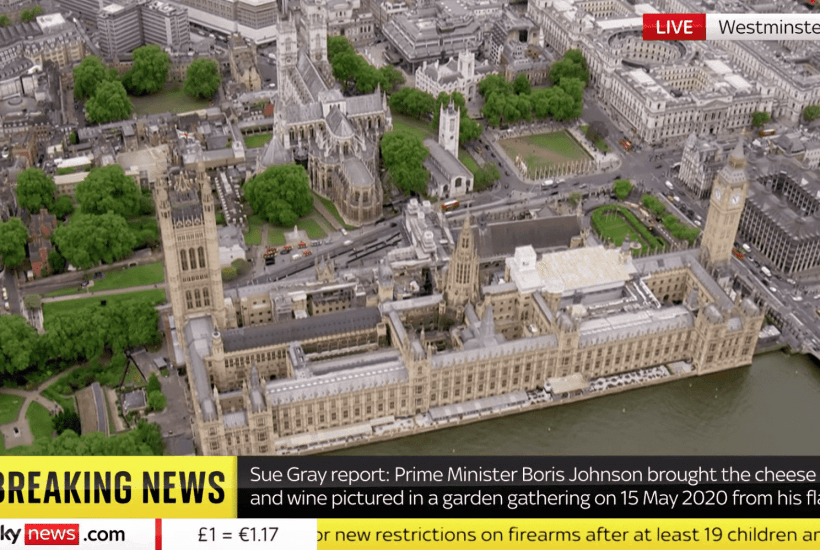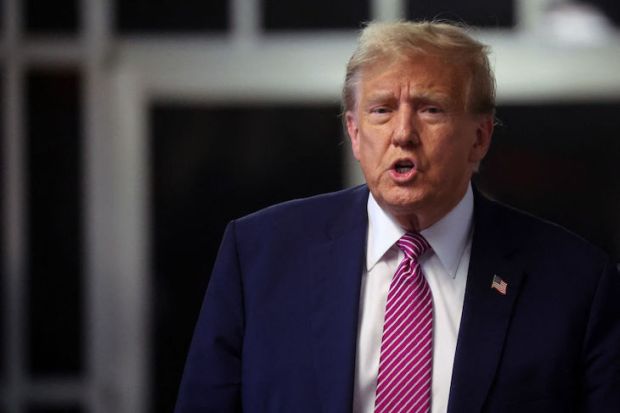It’s a helicopter day at Westminster. I’m writing this at my desk, which is about 200 metres from the House of Lords. My office is full of the racket made by a chopper flitting about over the Palace of Westminster and Whitehall, providing aerial camera shots of politicians – mainly the PM – moving around the place.
The reason today is the Sue Gray report, but helicopter days are relatively common at Westminster. The drone of the rotors is the easiest way to tell that this is a Big News day, when journalists spend more than the usual amount of time talking about extraordinary events and major developments.
As with so many things, there’s a mundane reason helicopter days seem to come around so often.
The broadcasters who fund the helicopters are rumoured to sign contracts obliging them to pay for a certain number of flying hours per year, whether or not they use the thing. So editors are said to have an incentive to declare Big News on a routine basis.
Along with the chopper come the liveblogs, the barrage of tweets and the oceans of coverage. Much of the lobby, supported by media resources from outside Westminster, is deployed to slice and dice every minute aspect of the Big News.
The lobby – where I worked for quite a long time – is always inclined to look at trees rather then woods. On helicopter days, that becomes a focus on twigs and leaves. Hence serious journalists getting excited – or pretending to get excited – about how many pages a report has.
Helicopter days are explicable. They’re also, in a narrow sense, justified. Big News needs extensive coverage. The Sue Gray report is a big deal. It’s about the biggest, most important principles of public life and politics: the people who set the rules broke the rules.
Yet helicopter days are also dreadful, harmful things. They’re the most noisy and dramatic illustration of the grim – and, I fear, growing – disconnect between ‘Westminster’ and the British public.
The spectacle of today’s helicopter day – the arial footage, the breathless pieces-to-camera, the billion-word tonnage of analysis – will strike a lot of people as stupid and annoying. Many of those people woke up this morning to learn that 19 primary school children were murdered in Texas last night. Pretty much all of them will have given some thought to energy bills and how much money they’ll have left in the bank at the end of this month.
In other words, they see other things as more important and interesting than Big News from Westminster.
(At 1 p.m. today, the Sue Gray report isn’t the most-read story on the BBC news site. That’s ‘Katie Price admits breaching restraining order’; the Texas shooting is number two. In fact, the Big News from Westminster only makes the number nine slot for the BBC’s online audience.)
None of this means that the Sue Gray report isn’t important. It is. People who make the rules should follow the rules. People given power by the public should not lie to the public. If we don’t uphold those standards, our entire system of representative democratic governance starts to fray.
That’s why political journalism matters. But political journalism is failing. Helicopter days are part of that failure. They’re an attempt to turn fundamentally dry, boring things – official reports, politicians in suits talking about official reports – into something dramatic, ‘accessible’ and exciting.
But those things are not and never will be exciting. At least, not to most people. Helicopter days are exciting for people who already care about politics, who are already excited enough about Sue Gray to be on Twitter having opinions about that picture or the Met police decision to issue fines to some people but not others.
But the helicopters won’t persuade most people, the ones who’ve already made up their minds about Sue Gray, parties and politics, to get excited. They don’t need the aerial footage or the liveblogs to help them reach their conclusions about what this all means.
It is true that, in the words of government defenders, the public have moved on from partygate – but only in the sense they largely decided some months ago that their prime minister is a lying hypocrite, then moved on to think about other things.
And having reached that judgment, what do they see when they look at Westminster today, all helicopters and excitement? A circus of self-indulgence, largely irrelevant to them. They already know what they think about partygate and the rest – so why are the clever, important folk at Westminster still going on about it? Yes Boris Johnson has done the wrong thing, aren’t they all as bad as each other, banging on and on about this stuff instead of thinking about what the rest of the country cares about?
To be clear, this isn’t a defence of the government or the PM – far from it. Nor is it a criticism of my old colleagues in the lobby, whose job remains vital. But it is a warning. Overblown, over-excited and over-promoted coverage of politics is bad. It’s bad for journalism, because it turns off the public. It’s bad for politics, because it helps persuade the public that politicians are too focused on the wrong things. And it’s bad for democracy, because the public disaffection and indifference it fuels make it easier for people in positions of power to misbehave and get away with it.
Ground the helicopters, please. The rest of us have things to do.
Got something to add? Join the discussion and comment below.
Get 10 issues for just $10
Subscribe to The Spectator Australia today for the next 10 magazine issues, plus full online access, for just $10.




















Comments
Don't miss out
Join the conversation with other Spectator Australia readers. Subscribe to leave a comment.
SUBSCRIBEAlready a subscriber? Log in